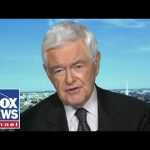In a world where political tensions seem to be the new normal, a recent discussion on a conservative news channel highlighted the ongoing drama between Democrat and Republican leadership, particularly concerning issues related to security and immigration. The panelists shared a glimpse into their perceptions on how the current administration is handling law enforcement and public safety. If there was ever a time when it felt like a theatrical showdown, it’s now.
The narrative kicked off with remarks that suggested an alarming direction the Democrats might be heading towards, raising eyebrows as they veered into the territory of conspiracy theories. The panel asserted a belief that the government had the ability to put certain groups on a list, enabling them to use lethal force without the due process that American citizens are accustomed to. While some may grimace at the thought of enforcing such measures, others find it hard to ignore the implications this holds for the country’s legal system—and rightly so.
As the conversation shifted, Florida Governor Ron DeSantis entered the scene as a key figure ready to challenge the status quo. The governor, praised for his proactive stance on immigration enforcement in Florida, recounted how he and fellow governors stepped up during what many viewed as a lack of federal action. It was a claim that kicked off discussions about the dichotomy of leadership styles—politicians who take action versus those who seem to be stuck in neutral. With the debate raging on issues of safety and federal law enforcement, it was clear that both sides were aiming to stake their claims in the sand.
The topic of crime, particularly in cities like Chicago, took center stage as the panel noted how the management—or lack thereof—by local leaders has resulted in an exodus of residents. Those who have fled the windy city have often found refuge in states like Florida, where leaders tout safer streets and a more favorable environment for families. It was almost like viewing a high-stakes game of chess, where the movements of the pieces could change the landscape dramatically. With public safety being a primal concern, citizens seem to rally behind those who provide tangible solutions rather than empty promises.
As the discussion turned to a broader view of immigration, the panelists contemplated why Democrats might reject credit for any peace measures and solutions proposed by Trump, especially when it comes to the Middle East. Many believe it’s a knee-jerk reaction rooted in historical opposition to Trump’s policies. The irony wasn’t lost on anyone that while some would praise Trump’s efforts abroad, similar attempts closer to home might get brushed aside. The complexities of these situations raise questions about the motives behind political rhetoric and voting behavior.
Through all these considerations, one thing became abundantly clear: the stakes are high, and the implications of political decisions resonate deeply with the American populace. Leaders who enforce laws to protect citizens might attract the support of those who prioritize safety. As the political chessboard continues to unfold, it’s likely that the conversations around public safety, immigration, and federal versus state authority will shape the political landscape for years to come. And like a good show, the audience is watching intently, popcorn and all—ready for the next move.




